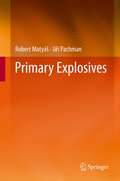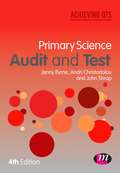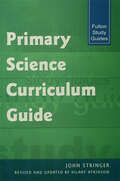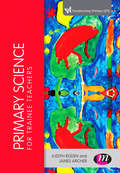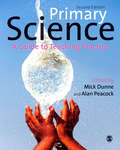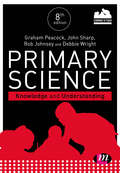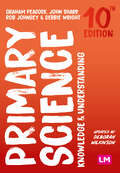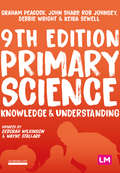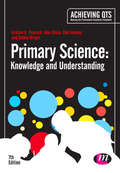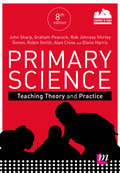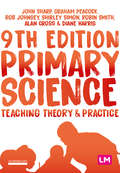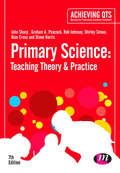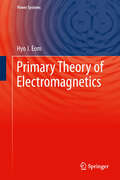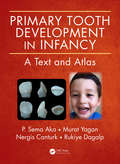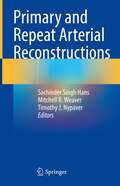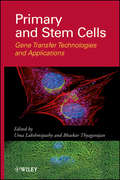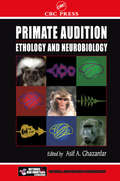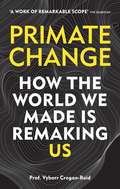- Table View
- List View
Primary Explosives
by Robert Matyáš Jiří PachmanThis is the first comprehensive overview of this topic. It serves as a single source for information about the properties, preparation, and uses of all relevant primary explosives. The first chapter provides background such as the basics of initiation and differences between requirements on primary explosives used in detonators and igniters. The authors then clarify the influence of physical characteristics on explosive properties, focusing on those properties required for primary explosives. Furthermore, the issue of sensitivity is discussed. All the chapters on particular groups of primary explosives are structured in the same way, including introduction, physical and chemical properties, explosive properties, preparation and documented use. The authors thoroughly verified all data and information. A unique feature of this book are original microscopic images of some explosives.
Primary Science
by John Sharp Graham Peacock Rob Johnsey Debbie WrightThis dictionary has been updated with new headwords, now over 650, makingit more comprehensive. Each entry is in alphabetical order and along with aclear and straightforward definition, has a funky colour illustration or diagramto help explain the meaning. Cross references link the user to other usefulwords in this dictionary so it is easy to build up vocabulary quickly. Thecolourful, modern design and artwork make it easy to pick out the word you need,and fully understand it.
Primary Science Audit and Test: Audit And Test (Achieving QTS Series)
by John Sharp Jenny Byrne Andri ChristodoulouIf you are a primary trainee, you must demonstrate a knowledge of science to be recommended for QTS. This popular, widely recommended, text helps you audit your knowledge of science and understand what learning you need to pass your course. A rigorous test helps you identify your strengths and weaknesses and can be revisited at key stages in your course as a tool to monitor and evaluate progress. The fourth edition has been updated in line with the new National Curriculum, includes more information on expanding and developing your knowledge of science and is linked to the 2012 Teachers' Standards.
Primary Science Curriculum Guide
by John StringerThis guide provides trainee teachers with an insight into the nature and teaching of primary science. It aims to introduce you to the ways in which children learn science, and to the science itself. Each Unit can be studied independently or used to support/prepare for school experiences. You will be directed towards additional reading, which will develop or confirm the subject knowledge you will need to achieve QTS. the curriculum guide is up-to-date, revised to take account of Curriculum 2000 and accepted 'good practice' in primary science teaching and learning. It is also flexible - many of the Units are stand-alone. They can be undertaken in any order, at your own pace, to complement school experiences. The Units are practical and feasible: the activities suggested can be undertaken by the non-specialist; in many cases without specialized equipment or access to large numbers of pupils. The guide is comprehensive, covering all the primary science elements in Curriculum 2000 and giving background information into other aspects of primary science teaching. It is also supportive - the guide suggests further texts to support trainees' own understanding of the scientific and pedagogical concepts involved. Additional reading draws on the TTA's list of approved key texts. The original text was piloted by students following a distance-learning PGCE course. It has been revised and updated in line with their comments and to meet Curriculum 2000 and Curriculum Guidance for the Foundation Stage. The text was initially developed as a core text for the part-time distance-learning course at Liverpool Hope and is designed for trainee teachers on distance learning and flexible routes, returning, converting or overseas teachers.
Primary Science Teaching Theory and Practice
by John Sharp Graham Peacock Rob Johnsey Shirley Simon Robin Smith Alan Cross Diane HarrisThe 6th edition of this popular core text provides the essential teaching theory and practice for primary science. It promotes effective teaching through secure pedagogical knowledge, covering the key skills of planning, monitoring and assessment and class management, and relating these specifically to primary science. This 6th edition is linked to the 2012 Teachers' Standards. With full coverage of the theory and practice required for effective and creative science teaching, this text is an essential guide for all trainees working towards QTS. Throughout, practical guidance and features support trainees to translate this learning to the classroom, embed ICT in their lessons and to understand the wider context of their teaching. Trainees will find it helpful to use this book alongside Primary Science Knowledge and Understanding. About the Achieving QTS series All the books in this successful series support trainees through their initial teacher training and guide them in the acquistion of their subject knowledge, understanding and classroom practice. All new titles within the series link to the 2012 Teachers' Standards and take into account recent changes in Initial Teacher Training.
Primary Science for Trainee Teachers
by James Archer Ms Judith RodenWith chapter sequencing following the new Curriculum, this book supports trainee Primary school teachers to make use of the opportunities presented in the new National Curriculum for effective and engaging Science teaching. Covering all of the areas of the new National Curriculum for primary science and offering insight into effective teaching, it helps you connect what you need to teach to how it can be taught. This comprehensive guide to teaching Primary Science will help you secure your subject knowledge, understand how children learn about science and know how to plan and teach effective and inspiring science lessons. Exploring opportunities in the new curriculum for creative and imaginative teaching, it shows you how to capitalize on opportunities to teach Science in a way that sparks children's interest. Includes the full National Curriculum Programme of Study for Science, key stages 1 and 2 as a useful reference for trainee teachers.
Primary Science: A Guide to Teaching Practice
by Alan Peacock Mick DunneWhy is science hard to teach? What types of scientific investigation can you use in the primary classroom? Touching on current curriculum concerns and the wider challenges of developing high-quality science education, this book is an indispensable overview of important areas of teaching every aspiring primary school teacher needs to understand including: the role of science in the curriculum, communication and literacy in science teaching, science outside the classroom, transitional issues and assessment. Key features of this second edition include: • A new chapter on science in the Early Years • A new practical chapter on how to work scientifically • Master’s-level ‘critical reading’ boxes in every chapter linking topics to relevant specialist literature • Expanded coverage of creativity, and link science to numeracy and computing This is essential reading for all students studying primary science on initial teacher education courses, including undergraduate (BEd, BA with QTS), postgraduate (PGCE, School Direct, SCITT), and also NQTs. Mick Dunne is Senior Lecturer in Science Education at Manchester Metropolitan University Alan Peacock is Honorary Research Fellow at the University of Exeter
Primary Science: Knowledge And Understanding (Achieving QTS Series)
by Debbie Wright Keira Sewell Professor John Sharp Mr Graham A Peacock Mr Rob JohnseyNow with online resources to support subject knowledge! Secure subject knowledge and understanding is the foundation of confident, creative and effective teaching. To help your students master this, the 8th edition of this established text now comes with a range of online resources available on the brand new companion website including: a comprehensive science subject knowledge audit reflective self-assessment questions per chapter a science subject knowledge checklist useful weblinks for primary science teaching You can use the science subject knowledge audit to assess your trainees’ progress and ensure they better understand their level of knowledge. Grading students' overall performance, highlighting areas for improvement linked to relevant chapter reading and the ability to share results with their lecturer, makes this the ideal science subject assessment tool. This 8th edition, covering the whole curriculum for primary science, has also been updated to include more on why science matters in primary schools and new content on ‘States of matter’, 'Rocks and soils’ and the 'Theory of Evolution'. New interactive activities are included to engage students in their learning and enable discussion. Using this book in conjunction with the free online resources really makes this the complete package for developing science subject knowledge.
Primary Science: Knowledge and Understanding
by John Sharp Graham Peacock Rob Johnsey Debbie WrightThe 6th edition of this popular core text is the essential subject knowledge book for primary science. Helping trainees to establish and consolidate a secure subject knowledge and understanding of primary science, it promotes the development of confident, creative and effective teachers. This 6th edition is linked to the 2012 Teachers' Standards. Providing full coverage of the required subject knowledge for primary science, this is a core text for primary trainees working towards QTS. Self assessment questions enable reader to understand their own level of knowledge and an M level extension feature in all chapters suggests avenues for further study at Masters level. Research summaries include the latest works in primary science and throughout interactive tasks engage the reader with the text, helping them to link theory and practice. Trainees will find it helpful to use this book alongside Primary Science Teaching Theory and Practice. About the Achieving QTS series All the books in this successful series support trainees through their initial teacher training and guide them in the acquisition of their subject knowledge, understanding and classroom practice. All new titles within the series link to the 2012 Teachers' Standards and take into account recent changes in Initial Teacher Training.
Primary Science: Knowledge and Understanding (Achieving QTS Series)
by John Sharp Rob Johnsey Debbie Wright Graham A PeacockAll the subject knowledge you need to teach primary science. The essential subject knowledge text for primary science. Secure subject knowledge and understanding is the foundation of confident, creative and effective teaching. This comprehensive text, covering the whole primary curriculum, includes interactive tasks, self-assessment questions and links to other resources in all chapters. Primary science matters. This 10th edition includes links to the ITT Core Content Framework and new content on children’s common misconceptions in science.
Primary Science: Knowledge and Understanding (Achieving QTS Series)
by John Sharp Rob Johnsey Debbie Wright Graham A PeacockAll the subject knowledge you need to teach primary science. The essential subject knowledge text for primary science. Secure subject knowledge and understanding is the foundation of confident, creative and effective teaching. This comprehensive text, covering the whole primary curriculum, includes interactive tasks, self-assessment questions and links to other resources in all chapters. Primary science matters. This 10th edition includes links to the ITT Core Content Framework and new content on children’s common misconceptions in science.
Primary Science: Knowledge and Understanding (Achieving QTS Series)
by John Sharp Rob Johnsey Debbie Wright Keira Sewell Graham A PeacockAll the subject knowledge you need to teach primary science. If you are training to be a primary school teacher, you need to understand what you need to know about primary science before you can teach it. To help you build your subject knowledge, this comprehensive text includes subject knowledge from each part of the primary science curriculum and comes with a wide range of resources so you can test you knowledge as you progress through the course. an online science subject knowledge audit with the ability to share results end of chapter self-assessment questions Interactive tasks a science subject knowledge checklist useful weblinks for primary science teaching Recommended further reading This new edition comes with a new chapter on science in curriculum.
Primary Science: Knowledge and Understanding (Achieving QTS Series)
by John Sharp Rob Johnsey Debbie Wright Keira Sewell Graham A PeacockAll the subject knowledge you need to teach primary science. If you are training to be a primary school teacher, you need to understand what you need to know about primary science before you can teach it. To help you build your subject knowledge, this comprehensive text includes subject knowledge from each part of the primary science curriculum and comes with a wide range of resources so you can test you knowledge as you progress through the course. an online science subject knowledge audit with the ability to share results end of chapter self-assessment questions Interactive tasks a science subject knowledge checklist useful weblinks for primary science teaching Recommended further reading This new edition comes with a new chapter on science in curriculum.
Primary Science: Knowledge and Understanding (Sixth Edition)
by John Sharp Rob Johnsey Debbie Wright Graham A. PeacockThe Sixth Edition of this popular core text is the essential subject knowledge book for primary science. Helping trainees to establish and consolidate a secure subject knowledge and understanding of primary science, it promotes the development of confident, creative and effective teachers. This Sixth Edition is linked to the 2012 Teachers' Standards. Providing full coverage of the required subject knowledge for primary science, this is a core text for primary trainees working towards QTS. Self assessment questions enable reader to understand their own level of knowledge and an M level extension feature in all chapters suggests avenues for further study at Masters level. Research summaries include the latest works in primary science and throughout interactive tasks engage the reader with the text, helping them to link theory and practice. Trainees will find it helpful to use this book alongside Primary Science Teaching Theory and Practice. About the Achieving QTS series All the books in this successful series support trainees through their initial teacher training and guide them in the acquisition of their subject knowledge, understanding and classroom practice. All new titles within the series link to the 2012 Teachers' Standards and take into account recent changes in Initial Teacher Training.
Primary Science: Teaching Theory And Practice (Achieving QTS Series)
by Robin Smith Alan Cross Diane Harris Professor John Sharp Mr Graham A Peacock Mr Rob Johnsey Dr Shirley SimonNow with online resources to support teaching practice! An extensive knowledge of the primary science curriculum is not enough for trainee teachers, they need to know how to teach science in the primary classroom. This is the essential teaching theory and practice text for primary science that takes a focused look at the practical aspects of teaching. It covers the important skills of classroom management, planning, monitoring and assessment and relates these specifically to primary science, with new material on assessment without levels. New coverage on being a scientist is included to help readers understand how science teaching goes far beyond the curriculum, whilst practical guidance and features support trainees to translate their learning to the classroom. And to support students even further with the very latest strategies in classroom practice, this 8th edition now includes the following online resources on the brand new companion website: practical lesson ideas for the classroom The Primary National Curriculum for science in Key Stages one and two tips for planning primary science useful weblinks for primary science teaching Using this new edition with the supporting online material makes it an essential guide to effective and creative science teaching.
Primary Science: Teaching Theory and Practice
by John SharpAn essential text for all primary trainees wishing to consolidate and develop their science teaching skills to ensure their classroom practice is creative and effective.
Primary Science: Teaching Theory and Practice (Achieving QTS Series)
by John Sharp Rob Johnsey Shirley Simon Alan Cross Diane Harris Graham A Peacock Robin James SmithAll you need to know about the theory and practice of teaching primary science. If you are training to be a primary school teacher, a knowledge of the primary science curriculum is not enough, you need to know HOW to teach science in primary schools. This is the essential teaching theory and practice text for primary science. It takes a focused look at the practical aspects of teaching and covers the important skills of classroom management, planning, monitoring and assessment, and relates them specifically to primary science. This new edition now includes a new chapter on creative curriculum approaches.
Primary Science: Teaching Theory and Practice (Achieving QTS Series)
by John Sharp Rob Johnsey Shirley Simon Alan Cross Diane Harris Graham A Peacock Robin James SmithAll you need to know about the theory and practice of teaching primary science. If you are training to be a primary school teacher, a knowledge of the primary science curriculum is not enough, you need to know HOW to teach science in primary schools. This is the essential teaching theory and practice text for primary science. It takes a focused look at the practical aspects of teaching and covers the important skills of classroom management, planning, monitoring and assessment, and relates them specifically to primary science. This new edition now includes a new chapter on creative curriculum approaches.
Primary Science: Teaching Theory and Practice (Sixth Edition)
by John Sharp Rob Johnsey Shirley Simon Robin Smith Alan Cross Diane Harris Graham A. PeacockThe Sixth Edition of this popular core text provides the essential teaching theory and practice for primary science. It promotes effective teaching through secure pedagogical knowledge, covering the key skills of planning, monitoring and assessment and class management, and relating these specifically to primary science. This Sixth Edition is linked to the 2012 Teachers' Standards. With full coverage of the theory and practice required for effective and creative science teaching, this text is an essential guide for all trainees working towards QTS. Throughout, practical guidance and features support trainees to translate this learning to the classroom, embed ICT in their lessons and to understand the wider context of their teaching. Trainees will find it helpful to use this book alongside Primary Science Knowledge and Understanding. About the Achieving QTS series All the books in this successful series support trainees through their initial teacher training and guide them in the acquistion of their subject knowledge, understanding and classroom practice. All new titles within the series link to the 2012 Teachers' Standards and take into account recent changes in Initial Teacher Training.
Primary Theory of Electromagnetics
by Hyo J. EomThis is a textbook on electromagnetics for undergraduate students in electrical engineering, information, and communications. The book contents are very compact and brief compared to other commonly known electromagnetic books for undergraduate students. The book emphasizes mathematical aspects of basic electromagnetic theory. The book presents basic electromagnetic theory starting from static fields to time-varying fields. Topics are divided into static electric fields, static magnetic fields, time-varying fields, and electromagnetic waves. The goal of this textbook is to lead students away from memorization, but towards a deeper understanding of formulas that are used in electromagnetic theory. Many formulas commonly used for electromagnetic analysis are mathematically derived from a few empirical laws. Physical interpretations of formulas are de-emphasized. Each important formula is framed to indicate its significance. This book shows a clear and rigorous account of formulas in a consistent manner, thus letting students understand how electromagnetic formulas are related to each other.
Primary Tooth Development in Infancy: A Text and Atlas
by P. Sema Aka Murat Yagan Nergis Canturk Rukiye DagalpThis color atlas and textbook describes the initial phase of human dentition. It includes more than 1,500 photographs of fetal and infant teeth up to the age of one year. Photographs with concise explanatory text depict steps of these developmental phases. The teeth are photographed from six different aspects: buccal, lingual, mesial, distal, incisal, and from the root direction. A supplementary software program for age estimation from dental measurements can also be used in conjunction with the material in this text.
Primary and Repeat Arterial Reconstructions
by Sachinder Singh Hans Mitchell R. Weaver Timothy J. NypaverThis text provides comprehensive atlas of open arterial reconstructions - primary and reoperations. This book describes in detail the 1) indications of the operation, 2) surgical anatomy 3) operative steps in a sequential order with easy to understand illustrations, 4) recognizing a potential complication 5) and if a complication occurs, the steps involved in managing the complication.
Primary and Stem Cells
by Uma Lakshmipathy Bhaskar ThyagarajanThis book describes basic cell engineering methods, emphasizing stem cell applications, and use of the genetically modified stem cells in cell therapy and drug discovery. Together, the chapters introduce and offer insights on new techniques for engineering of stem cells and the delivery of transgenes into stem cells via various viral and non-viral systems. The book offers a guide to the types of manipulations currently available to create genetically engineered stem cells that suit any investigator's purpose, whether it's basic science investigation, creation of disease models and screens, or cells for therapeutic applications.
Primate Audition: Ethology and Neurobiology (Frontiers in Neuroscience)
by Asif A. GhazanfarBringing together the knowledge of world experts on different aspects of primate auditory function, this book bridges the epistemological gap between primate ethologists and auditory neurobiologists. Leading ethologists, comparative psychologists, and neuroscientists who have developed new experimental approaches apply their methods to a variety of issues dealing with primate vocal behavior and the neurobiology of the primate auditory system. The synthesis of ethological and neurobiological approaches to primate vocal behavior presented in this book will yield a rich understanding of the acoustic and neural bases of primate audition and shed light on the evolutionary precursors to speech.
Primate Change: How the world we made is remaking us
by Vybarr Cregan-Reid'A work of remarkable scope' - GuardianFT Best science books of 2018Primate Change has been adapted into a radio series for the BBC WORLD SERVICE.*This is the road from climate change to primate change.PRIMATE CHANGE is a wide-ranging, polemical look at how and why the human body has changed since humankind first got up on two feet. Spanning the entirety of human history - from primate to transhuman - Vybarr Cregan-Reid's book investigates where we came from, who we are today and how modern technology will change us beyond recognition.In the last two hundred years, humans have made such a tremendous impact on the world that our geological epoch is about to be declared the 'Anthropocene', or the Age of Man. But while we have been busy changing the shape of the world we inhabit, the ways of living that we have been building have, as if under the cover of darkness, been transforming our bodies and altering the expression of our DNA, too.Primate Change beautifully unscrambles the complex architecture of our modern human bodies, built over millions of years and only starting to give up on us now.'Our bodies are in a shock. Modern living is as bracing to the human body as jumping through a hole in the ice. Our bodies do not know what century they were born into and they are defending and deforming themselves in response.'
